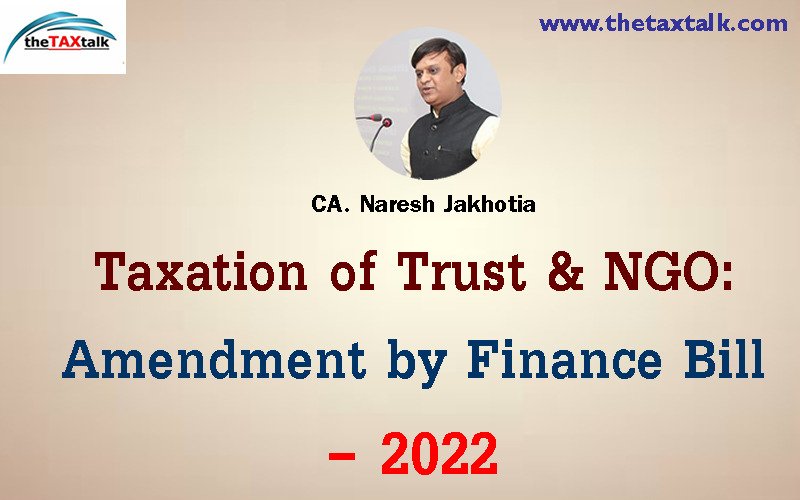![]()
Taxation of Trust & NGO: Amendment by Finance Bill – 2022
With the rise in the Corporate Social Responsibility (CSR) spending of the companies, the monitoring over the trusts & NGO has also increased. Every passing budget is making the tax provision more stringent & complicated for the trusts. Budget – 2022 has proposed numerous provisions & significant changes in the taxation of Trusts & NGO. Let us have a look at some of the key changes proposed in the Finance Bill -2022 with regard to charitable trusts & NGO:
-
Cancellation of tax exemption:
In the last Budget of 2021, the procedure for granting the new registration was simplified. Now, the power of cancellation of the registration of the trust has been widened. It is now proposed that the Principal Commissioner may, after giving adequate opportunity of being heard, cancel the registration of an approved charitable institution (for tax exemption) if it is found to have violated any of the following conditions:a) The income is applied towards objects other than for which it is established;
b) It has earned profits from a business which is not incidental to the attainment of its objects;
c) It has not maintained separate books of account for a business activity which is incidental to the attainment of its objects;
d) It has applied any part of its income for the benefit of any particular religious community or caste [In my view, now all the caste specific trusts may be required to amend the bye-laws for income tax exemption];
e) It has undertaken any activity that is not genuine or has not adhered to the conditions subject to which it was registered.
f) It has applied any part of its income for private religious purposes which does not ensure for the benefit of the public.
-
Penalty for unreasonable benefit:
At present, section 13 of the Income tax Act disallows benefit to specified persons such as founders, trustees and their relatives from deriving benefit. However, there is no provision of penalty for misuse of funds of the trust or institutions. Hence to discourage such misuse of funds, it is proposed to insert section 271AAE in the Act.As per the section 271AAE, if during any proceedings, it is found that founders, trustees or their relatives derive any ‘unreasonable benefit’ then the Assessing Officer may direct to pay by way of penalty equal to the amount of income applied by such trust or institution for the benefit of specified person where the violation is noticed first time and twice the amount of such income where the violation is noticed again in any subsequent years. Moreover, this penalty is leviable in addition to the penalty leviable, if any under any of the provisions of Chapter-XXI.
-
Tax liability in case exemption is denied:
In case of violation of any provision of the income tax as applicable to a tax-exempt institution (e.g., investing funds in modes not specified u/s 11(5) or a trustee deriving unreasonable benefit etc.) the tax would be restricted only to:a) The amount of funds not invested in modes specified u/s 11(5) of income tax (e.g., investing the institution’s funds in shares or stocks);
b) The amount of unreasonable benefit provided to specified persons (e.g., a trustee or a trustee’s relative).
-
Tax on accumulated income:
In any given financial year, the tax-exempt institution must apply at least 85% of its total income. The balance 15% is unfettered and may be booked as a reserve fund and this would not be considered as accumulated income. However, in case the institution is unable to spend at least 85% of its income, it has the option to file online Form No. 10 and accumulate the unspent income for charitable purposes in the next 5 years. Such accumulation must be for a specified charitable purpose.At present, if the amount is not used within 5 years then it becomes taxable in the sixth year. Now, an amendment has been proposed by the Finance Bill 2022 to provide that the amount would be taxable in the 5th Year and not the 6th Year.
-
Follow the cash system for spending:
As already discussed above, trusts/NGO are required to apply at least 85% of the total income during any fiscal year for charitable activities. However, the method of such application is not specifically provided in the Income Tax Act and so it was required to be determined on the basis of method of accounting i.e., cash or accrual system followed by the institution. Now, it has been proposed that ‘application of income’ for the purpose of the Income tax Act shall mean actual payment only and shall not include expenses accrued but not paid during the year. In short, if the income is not “actually” paid, it will not be considered as application of income. Deduction on the basis of mercantile system of accounting will not be available to the trusts and NGO. -
Maintaining ‘books of Account:
While accounts of charitable trusts and institutions are required to be audited there is no specific provision under the act to maintain ‘books of account’. It is now proposed that from 1st April 2022, charitable trusts and institutions shall be required to maintain books of account as may be prescribed. The income tax rules may soon prescribe these and the mode of maintaining it.

